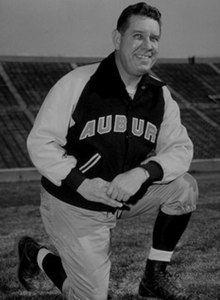Ralph Jordan
 |
|
| Sport(s) | Football, basketball, baseball |
|---|---|
| Biographical details | |
| Born |
September 25, 1910 Selma, Alabama |
| Died | July 17, 1980 (aged 69) Auburn, Alabama |
| Playing career | |
| Football | |
| 1928–1932 | Auburn |
| Basketball | |
| 1929–1932 | Auburn |
| Baseball | |
| c. 1930 | Auburn |
| Position(s) |
Center (football) Guard (basketball) Pitcher (baseball) |
| Coaching career (HC unless noted) | |
| Football | |
| 1934–1942 | Auburn (assistant) |
| 1945 | Auburn (assistant) |
| 1946 | Miami Seahawks (assistant) |
| 1947–1950 | Georgia (assistant) |
| 1951–1975 | Auburn |
| Basketball | |
| 1933–1942 | Auburn |
| 1945–1946 | Auburn |
| 1946–1950 | Georgia |
| Head coaching record | |
| Overall | 176–83–6 (football) 136–103 (basketball) |
| Bowls | 5–7 |
| Accomplishments and honors | |
| Championships | |
| Football 1 National (1957) 1 SEC (1957) |
|
| Awards | |
| Football 4x SEC Coach of the Year (1953, 1957, 1963, 1972) |
|
|
College Football Hall of Fame Inducted in 1982 (profile) |
|
James Ralph "Shug" Jordan (/ˈʃʊɡ ˈdʒɜːrdən/ SHUUG JURD-an; September 25, 1910 – July 17, 1980) was an American football, basketball, and baseball player and coach of football and basketball. He served as the head football coach at Auburn University from 1951 to 1975, where he compiled a record of 176–83–6. He has the most wins of any coach in Auburn Tigers football history. Jordan's 1957 Auburn squad went undefeated with a record of 10–0 and was named the national champion by the Associated Press. Jordan was also the head men's basketball coach at Auburn (1933–1942, 1945–1946) and at the University of Georgia (1946–1950), tallying a career college basketball record of 136–103. During his time coaching basketball, he also served as an assistant football coach at the two schools. Auburn's Jordan–Hare Stadium was renamed in Jordan's honor in 1973. Jordan was inducted into the College Football Hall of Fame as a coach in 1982.
...
Wikipedia
